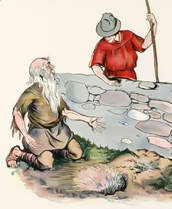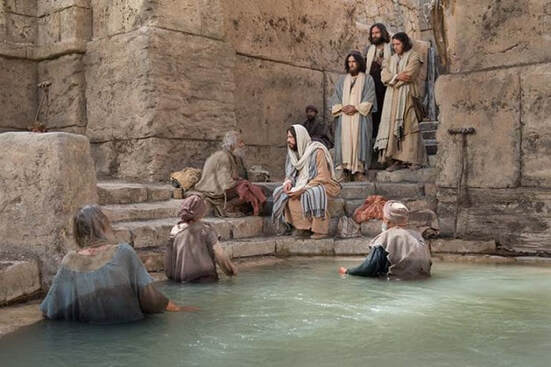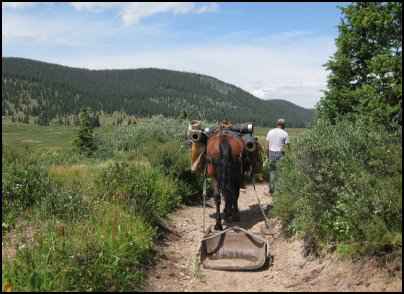|
Illustration by Matt Chinworth In the last two weeks, I have discussed five stewardship principles that we can find in the Parable of the Talents (Matt. 25-30). They were:
As I have suggested before, stewardship is learning to care for all our God-given resources. What we tend to do is take our eyes off of our daily responsibilities, and we begin to focus on building personal wealth for our future. As we read the Bible, including the Parable of Talents and the 10 Commandments (Exodus 20:5b-6), we consistently hear that if we follow God’s ways TODAY we will receive His blessings in the FUTURE, and if we reject His ways, we will bring trouble upon ourselves and those we love. If we live obediently, God will fulfill ALL His promises. Said another way, if we have stewarded well our soul, time, and talents then our obedience will be rewarded. We see this promise of blessing and warnings against disobedience in a most profound way when the people of Israel first entered the Promised Land. In Joshua 8, we read how the people fulfilled a command that God had given them through Moses long before they crossed the Jordan River. In Deuteronomy 11:13-17 and 26-29 God told Moses: And it shall be that if you earnestly obey My commandments which I command you today, to love the Lord your God and serve Him with all your heart and with all your soul, then I will give you the rain for your land in its season, the early rain and the latter rain, that you may gather in your grain, your new wine, and your oil. And I will send grass in your fields for your livestock, that you may eat and be filled. Take heed to yourselves, lest your heart be deceived, and you turn aside and serve other gods and worship them, lest the Lord’s anger be aroused against you, and He shut up the heavens so that there be no rain, and the land yield no produce, and you perish quickly from the good land which the Lord is giving you. In Deuteronomy 27-28, this command was again given to Moses to pass along to the people. This time it came with further details as to how it was to be done. After the People of Israel crossed the Jordan; set up memorial stones commemorating God’s intercession; circumcised all males; won the battle for Jericho, and then lost, rectified the sin issue, and then won the battle for Ai, Joshua called the people to fulfill Moses’ command: Now Joshua built an altar to the Lord God of Israel in Mount Ebal, as Moses the servant of the Lord had commanded the children of Israel, as it is written in the Book of the Law of Moses: “an altar of whole stones over which no man has wielded an iron tool.” And they offered on it burnt offerings to the Lord, and sacrificed peace offerings. And there, in the presence of the children of Israel, he wrote on the stones a copy of the Law of Moses, which he had written. Then all Israel, with their elders and officers and judges, stood on either side of the ark before the priests, the Levites, who bore the ark of the covenant of the Lord, the stranger as well as he who was born among them. Half of them were in front of Mount Gerizim and half of them in front of Mount Ebal, as Moses the servant of the Lord had commanded before, that they should bless the people of Israel. And afterward, he read all the words of the law, the blessings and the cursings, according to all that is written in the Book of the Law. There was not a word of all that Moses had commanded which Joshua did not read before all the assembly of Israel, with the women, the little ones, and the strangers who were living among them (Joshua 8:30-35). Unfortunately, as we continue to read in Joshua and Judges we discover that too many of the Israelites sought only the blessings of God without demonstrating a willingness to follow God’s commands. And equally unfortunate, is that human nature has not changed. We, also, seek the blessings without a consistent desire to follow Godly principles with child-like faith and obedience. Yes, daily obedience is hard! But that’s why God gave us the Holy Spirit to indwell our hearts and to lead us into paths of righteousness.
We also need to acknowledge that even with good intentions and our best efforts, sometimes the promised blessings do not immediately flow. The health and wealth gospel, which has filled and corrupted the theological airways, is telling us a half-truth. They fail to point to Biblical passages that give us “the rest of the story.” In day-to-day life, like in English grammar, there are always exceptions to every rule. And in other ways, life is like a higher-level college class where there are pre-requisites. As Phyllis and I do our morning devotional time, we regularly pray for several people/families who are in our network of friends whose lives are currently filled with significant “challenges.” They are individuals who are genuinely seeking to serve God, but they are not currently feeling the love of God in a way that manifests itself in physical, relational, and emotional blessings. We both know, from hindsight, that God’s love WAS THERE for us in the deep and dark valleys of life when our emotions and anxieties overwhelmed us. In fact, His grace and love were the very things that sustained us in the midst of those “fiery furnace” experiences. The wealth of His care for us is not manifest daily, but it is always there as he gives us a future and a hope (Jer. 29:11). How do we intellectually, theologically, and emotionally come to grips with the reality that there will be difficult valley experiences in life, no matter how good a steward we are? How do we keep our focus on stewarding well all that God has given us when the blessings are not flowing like we need them to flow, or should I say we want them to flow? How do we learn to live life to the fullest without being overwhelmed with the needs we know we will face tomorrow, or should I say we think we will face tomorrow? How do we learn to value the things that God values? We will begin to look at these questions, and a few more in the days ahead. Yours in Christ, Mark R. Elliott
0 Comments
Last week I suggested three stewardship principles that are expressed in the Parable of Talents (Matt. 25:14-30). They were:
The reward for being an effective steward is that we are usually given MORE to steward. That happened with the servant who was given five and the one given two talents as they both heard from their lord, “You were faithful over a few things, I will make you ruler over many things.” This reality has led to an unwritten, but well-known organizational principle: if you want something done, ask a busy person to do it. They are the people who are either stewarding well their talents, are overachievers, or are workaholics. Experience has also told us that you don’t ask someone who is simply a “bystander”—kind of like the servant who was given a single talent. The average church in America needs to do a better job of identifying the hungry, humble, and teachable novices in its midst, and then begin to equip and release them—that’s biblical disciple-making. It takes longer in the short run, but over time it has always been proven to be the best. That’s helping someone steward their soul and their talents well. There is an interesting observation I have made regarding those who seem to have an abundance of talents. Those who are born with the most “natural ability” can too easily depend on their personal skill set and miss out on the additional blessings God is willing to provide. The reality is that no matter how gifted we are, we can do nothing of eternal significance without God (John 15:5). God uses us based on our availability (obedience) more than on our natural ability. The “least among us” are often better used by God. Moses was not able to be used by God to free His people when he was a prince of Egypt, but God was able to use him when he was herding his father-in-law's livestock on the backside of the wilderness I will extend a brief warning at this point. You don’t have to wait until all the resources arrive before you get started. If God has shown you what to do, then be obedient with what He has already placed in your hands! God will always provide what you need, when you need it if you are seeking to accomplish what He has called you to do. Now if it’s your personal agenda and for your personal pleasure, then don’t wait on God for help. Fifth, poor stewardship brings limitations (Matthew 25:26-28). The man who buried his talent heard this from his lord, “You wicked and lazy servant, you knew that I reap where I have not sown, and gather where I have not scattered seed. So you ought to have deposited my money with the bankers, and at my coming, I would have received back my own with interest. So take the talent from him, and give it to him who has ten talents. For to everyone who has, more will be given, and he will have abundance; but from him who does not have, even what he has will be taken away.” We always need to keep in mind that in this parable Jesus pointed out that the master distributed his talents to each of his servants according to their unique God given ability (vs 15). Because God blesses each of us differently, equal outcomes cannot and are not the measure of success. The parable indicates that we are evaluated based upon our effort—and the servant who was given a single talent was simply described as “lazy.” I’ve used a bit of a crude, but hopefully memorable, way of stating this principle: “God ain’t dumb! If you haven’t taken care of what He has already given you, why on earth would He want to give you more? Probably the statement that gives us the greatest pause is when the master says, “Take the talent from him (the servant given a single talent), and give it to him who has ten talents.” Our culture and government have adopted the “Robin Hood” mindset where we believe that it is ALWAYS right to take from the rich and give to the poor. When we do so without pausing to ask, “Are the poor fulfilling their stewardship responsibilities?” we are ignoring stewardship 101 lessons, and our actions are potentially going against the expressed will of God. I will come back to the question, “How can we provide for the genuine needs of those around us?” when we discuss the third parable in Matthew 25. But before we do that, I need to finish our stewardship discussion by pointing to a sixth principle: we are expected to steward well our financial wealth. However, space limitations require that I address the difference between building wealth and stewarding our wealth next week. Until then, remember to…
Yours in Christ, Mark R. Elliott  When I pastored a small church in north-central Iowa, I regularly did a children’s sermon. I used an object to provide a visual reference that I tied into the main topic of that day’s sermon. I found it interesting—and over time instructive—that after the services, the comments I received usually related to the children’s sermon. Even in a very literate and well-educated nation, we are still visual and oral learners at heart. As I shift from the first to the second parable in Matthew 25, let me simply remind you how important stories and illustrations are to effective communication. There is an Aesop Fable by the title The Miser that has been passed down from generation to generation. It goes like this: A miser sold all that he had and bought a lump of gold, which he buried in a hole in the ground by the side of an old wall. He went to look at it daily. One of his workmen observed his frequent visits to the spot and decided to watch his movements. He soon discovered the secret of the hidden treasure, and digging down, came to the lump of gold, and stole it. The miser, on his next visit, found the hole empty and began to tear his hair and to cry loudly with deep lamentations. A neighbor, seeing him overcome with grief and learning the cause, said to him, “Pray do not grieve so, but go and take a stone, and place it in the hole, and pretend that the gold is still lying there. It will do you as much good as the gold did. For when the gold was there, you owned it, but it did not benefit you, as you did not make the slightest use of it.” Aesop was a gifted storyteller who knew that simple stories could be understood and remembered by people who were living simple lives. Another masterful storyteller was Jesus of Nazareth. We call His stories parables—a Greek word we have brought into the English language that simply means, “to cast alongside.” A parable is a story that lays two things side-by-side for the purpose of comparing, contrasting, or explaining. We are currently focusing on three inter-related parables from Matthew 25—they speak to key principles of a Biblical Worldview. The first story talked about one of the most festive and important events in family life—a wedding. He used it to provide a picture of personal responsibility. The second story describes a business world event where an owner gives three employees a significant opportunity to improve and prove their work experience. He used it to describe effective stewardship. The story goes like this: For the kingdom of heaven is like a man traveling to a far country, who called his own servants and delivered his goods to them. And to one he gave five talents, to another two, and to another one, to each according to his own ability; and immediately he went on a journey. Then he who had received the five talents went and traded with them, and made another five talents. And likewise he who had received two gained two more also. But he who had received one went and dug in the ground, and hid his lord’s money. After a long time the lord of those servants came and settled accounts with them. Both Matthew and Mark point out how often and why Jesus used parables:
All these things Jesus spoke to the multitude in parables; and without a parable He did not speak to them, that it might be fulfilled which was spoken by the prophet, saying: “I will open My mouth in parables; I will utter things kept secret from the foundation of the world” (Matthew 13:33-34). And with many such parables He spoke the word to them as they were able to hear it. But without a parable He did not speak to them. And when they were alone, He explained all things to His disciples (Mark 4:33-34). Mark also points out that even though Jesus used real-life stories to speak of eternal spiritual truths, some people are still not willing to open their hearts and minds to God. After Jesus told the crowd the Parable of the Sower in which seed is sown on four different kinds of soil with four different responses, He then said, “He who has ears to hear, let him hear!” Mark goes on to record Jesus’ explanation for the three soils that did not produce grain, and then tells His disciples: To you it has been given to know the mystery of the Kingdom of God; but to those who are outside, all things come in parables, so that “Seeing they may see and not perceive, And hearing they may hear and not understand; Lest they should turn, And their sins be forgiven them” (Mark 4:9-12). Let me suggest that although we cannot control what people do after we share with them the good news, we do have control over how we communicate that good news.
May God fill your mouth with effective communications that He can then use to produce fruit. Yours in Christ, Mark R. Elliott, AMS  In the last two weeks, I have provided a description, given a Biblical example, and shared general examples of learned helplessness. Last Wednesday Phyllis and I had dinner with a couple that a few years earlier was facing one of the most difficult circumstances a pastor and wife could face. In our two-hour dinner conversation, we heard multiple stories of God’s redeeming and transforming power at work. As we listened, our thoughts went back to the many previous conversations that took place. Then I began to think about the process that God used and the time, effort, and energy that this couple along with four other couples had invested. The end result has been a transformed marriage, an intact family, and an exciting new ministry opportunity. The process we used mirrors the one Henry Cloud suggests someone desiring to overcome learned helplessness should use. In chapter seven of Cloud’s book Boundaries for Leaders, he describes the following five-part process for overcoming learned helplessness. 1. Create Connections—Don’t think you can do it on your own and skip this step. In fact, it is so significant that Cloud actually wrote a separate book on this topic: The Power of the Other. He suggests that you set up a small group of six to ten people who are experiencing the same challenges. As you form the group, establish the needed structure, time, and place where you can go through the process together. Group members need to come with a positive tone, create a safe environment, and develop transparency so that everyone is honest and willing to share their victories and their difficulties. Let me add a hearty AMEN to this step from my own personal experience. The value and impact of such a group is immeasurable. I would also point out that Satan is well aware of the importance of creating connections. We would call one of Satan’s groups a gang. Think about how many gangs you will find in communities where learned helplessness has become the norm. 2. Regain Control—I have lost count of the number of times I have taken a napkin or scrap of paper and described this step. Cloud calls it the “Control Divide.” Take a piece of paper and draw a line down the middle creating two columns. In column one, write down things that are making your ministry difficult and are things that you cannot control. Next, take time to REALLY focus on and reflect on the impact of the items on the list—they are real and you don’t want to deny they exist. Next, draw a stop sign at the bottom of the column and stop thinking about the items in column one. Next, and most importantly, in the second column write down everything you can do and that you can control—things that can create positive results. I suggest that you keep the paper with your daily devotional materials and pray through the list daily. When you get to the bottom of the first column, stop, reflect on the list, and then place the items at the foot of the cross. Then prayerfully work through the second column picking at least one of the items that you can do that day. As God prompts you, add items to both lists. Doing this daily will help you to slowly shift the spotlight away from the items in column one and provide a better focus on the items in column two. Cloud opened the chapter with a great illustration of this process. When Tony Dungy accepted the head coaching job of the Tampa Bay Buccaneers he faced a “hopeless” task. He faced significant headwinds. But instead of focusing on all the negatives, none of which he could control, Dungy identified three critical areas that he knew from experience differentiated good football teams from bad ones: turnovers, penalties, and special team play. He began to focus on these three areas because they were factors he could control, and if the team did better in these areas they would contribute to success. The Bucs saw a huge turnaround under Coach Dungy. Cloud states two powerful things happen when we focus on what we can control. First, we get results. But maybe more importantly, a change takes place in our brains so we can function better. Is this what Paul is describing in Romans 12:2: “Do not be conformed to this world, but be transformed by the renewing of your mind, that you may prove what is that good and acceptable and perfect will of God?” 3. Take Note of the Three P’s—I talked about the Three P’s in a previous article: Personal, Pervasive, and Permanent. He suggests we journal or log the negative thoughts that are impacting us. Then, review each of the thoughts and write specific facts to refute them. Our natural tendency is to focus on the one negative and ignore the dozens of positive things that God does daily in our lives. Over time, we become willing to accept reality and begin to take positive action. The positive impact of this step is multiplied when you begin to share your positive experiences and hear the positive experiences of others in your small group. 4. Add Structure and Accountability—Social psychology research has shown that when people assign a specific time and place for completion of specific tasks and goals, their chances of success increase by up to 300 percent. Structure, stability, security, routine, and predictability—all are necessary for our brains to function at their highest levels. Reread the last sentence as you think about what has been happening the last two years. What’s the probability that we are not currently functioning at our highest level? Henry states, “I’ve encouraged individuals, including some very high-performers, to break their daily activities down to very small increments, sometimes as small as thirty-minute segments, and specifically plan what they would do in that time. It sounds pedantic, but it absolutely works. Having them write down their objectives for every thirty minutes of the day helps identify and isolate activities that are particularly endangered due to inaction and three P’s thinking.” How would the discipline of doing something like this help you deal with the fluid world we are living in today? 5. Take the Right Kind of Action with the Right Kind of Accountability—Henry writes, “By right kind of action I do not mean mere activity. Busyness is not action that builds momentum or results. The action you want is action that specifically drives results. And the accountability you want is the kind that drives success, not the kind that only measures results and keeps score. What I’m talking about is accountability that creates high performance and results. Figure out what that is, and you will undoubtedly see winning results as well. Said another way, don’t count the score. Count the behaviors that run up the score.” I can say from firsthand experience that God can use this five-part process. My question is, “If you are experiencing learned helplessness, are you willing to step out in faith, ask others to help, and put in the work that it will take to see the real-life transformation?” Yours in Christ, Mark R. Elliott, AMS Last week I used Henry Cloud’s book Boundaries for Leaders to describe Learned Helplessness. Let me begin this week by giving an example of how Jesus confronted it. John alone records for us the encounter Jesus had with a paralytic at the Pool of Bethesda. After this there was a feast of the Jews, and Jesus went up to Jerusalem. Now there is in Jerusalem by the Sheep Gate a pool, which is called in Hebrew, Bethesda, having five porches. In these lay a great multitude of sick people, blind, lame, paralyzed, waiting for the moving of the water. For an angel went down at a certain time into the pool and stirred up the water; then whoever stepped in first, after the stirring of the water, was made well of whatever disease he had. I began to look at this passage very differently several years ago when I heard a pastor who was serving in a deeply impoverished inner-city area. He had grown up in a stable blue-collar family but now encountered learned helplessness on a daily basis. From his experience, he pointed out that Jesus asked the man, “Do you want to be made well?” I had previously missed that “little detail.” The man had been in his condition for thirty-eight years. Depending on the age when his injury/illness began, it is possible that he had outlived many of his contemporaries—that might have been the reason he caught Jesus’ eye. Jesus saw what the man had been blinded to by learned helplessness—the possibility of getting better.
From this very short description of the encounter, we can glean a lot about what learned helplessness does to one’s perspective. We become…
As I indicated last week, there are seasons in the life of every human being where we can slide into learned helplessness. We can find ourselves in a very difficult place emotionally, physically, or spiritually where everything seems to be beyond our control, and we don’t see an end to it. We begin to think and act like the paralytic at the pool of Bethesda. Fortunately, for many of us, these seasons turn out to be “relatively short” walks through the valley of the shadow of death. We begin to lean into the skills and experiences we have used in the past; we leave the things we can’t control to God; we walk in simple child-like obedience doing the next right thing. We are fortunate to be one who has been blessed by God’s mercy as He extends it to thousands of generations of those who love Him and keep His commandments (Genesis 20:5b). However, an increasing number of people in our nation are born into generational learned helplessness. They have no positive experiences upon which to lean; they don’t have healthy role models upon which to build their life; they are living with the consequences of their parent’s and sometimes grandparent’s decisions. Unfortunately, the iniquities of previous generations are visited upon the children to the third and fourth generations (Exodus 20:6). I have observed the slow and often regressive work of God in the life of those who have experienced the impact of generational sins and are seeking to find a better way through Jesus Christ. Patient, persistent love is required, and that isn’t easy in our instant gratification culture. Before I describe the five-step process Cloud suggests for overcoming learned helplessness, let me challenge you at a few points:
Yours in Christ, Mark R. Elliott, AMS Before I shift our focus away from the Parable of the Ten Virgins in Matthew 25 and the principle of personal responsibility, I need to point out that Learned Helplessness exists; it is alive and well in our culture; we need to understand the impact it is having. Although I was aware of the general concept, it wasn’t until I read Henry Cloud’s book Boundaries for Leaders that I actually came to grips with the individual AND cultural prominence and devastating impact of Learned Helplessness. As I read the book, I paused after reading Chapter 6 to reflect on my visits to impoverished West Africa. As Cloud described the impact Learned Helplessness has upon individuals and businesses, I thought, “I’ve seen it impact a whole nation: Niger!” Our daughter, Emily, was serving there as a missionary among the Fulani—a seminomadic people group who call themselves the “Bringers of Islam.” Having grown up in a semi-arid rural region of the US, I was able to relate in many ways to the agrarian life of the Fulani. However, I was not prepared for a world that looked just like the one described in Bible times. I had read in Numbers about millstones and mortars being used by the Israelites as they ground the manna. I didn’t see a single millstone—a little more high-tech—but I did see a lot of mortars being used to pound their millet. The “Why don’t they ______” questions just kept pouring into my mind. I noticed that there wasn’t a single inch (let alone kilometer) of railroad or interstate in the whole nation. There was only one bridge across the Niger River, and most of the roads that do exist are so rough that sometimes it’s better to drive on the side of the road. I acknowledge that Niger is a nation with limited natural resources, and I admit that I grew up in a huge energy-producing state—Wyoming with its oil, natural gas, and coal. But I also know that to a Wyoming native, water rights are more valuable than mineral rights. You can’t live long without water and neither can your cattle or crops. So what grabbed my attention the most was the fact that I did not see a single dam (called a stock pond or tank in some regions of the US) of any kind. I recalled that when my parents bought part of a huge ranch that was being broken up and sold, the first thing we had to do was to build two dams—one for the east canyon pasture and one for the west canyon pasture—we were fortunate that the canyon already had a dam. Without water for the cattle, those grazing areas would be worthless. I also remember hearing my grandfather talk about working on a crew that built some of the early highways in the Black Hills. He talked about using a horse-drawn slip—talk about SLOW HARD WORK! (If you don’t know what a slip is you can hit this link: Horse Power). I began to think about how all of the early dams in Wyoming were built using a slip, and I asked myself, Why haven’t the people of Niger built dams? The dams would provide water for themselves, their livestock, their crops, and minimized flash flooding. Yes, it is SLOW HARD WORK, but water is LIFE! All of these thoughts flooded through my mind as I pondered the concept of Learned Helplessness, how it had consumed an entire nation, and the devastating human toll that it was taking. I wondered, “How do you begin to help people whose lives are so destitute?” I’ll address that question in the following articles, but for today I want you to understand what Learned Helplessness is, and convince you to see that it does exist in our culture. In fact, I would suggest that it has a direct impact on how you help someone acknowledge their need to accept personal responsibility and in some ways help them accept the Gospel that provides eternal life. As I continued to read Boundaries for Leaders, my thoughts shifted from Niger to the small struggling churches in our network--churches where people have lost hope and moved into a survival or fortress mindset. Cloud describes Learned Helplessness this way: A positive and optimistic brain is a productive, energized brain ready to explore new ideas and to grapple with hard problems….[by contrast] Learned Helplessness is a change in the software of the brain that occurs when one of the most fundamental laws of the universe is interrupted in our lives: the law of cause and effect…in infancy I can cry for food; in adulthood I can get a job to buy a meal…if you feel lonely, you can call someone and go to dinner together. The operating principle we learn is: do something good and something good happens to you…We depend on this law every day…It really works until we find ourselves in a situation where we are continuously affected negatively, and we have absolutely no control over the things that are affecting us. Cloud quotes one researcher who has identified a downward spiraling three-step pattern that leads to Learned Helplessness he calls the “three P’s.” They are:
But even before COVID, entrenched Learned Helplessness existed in our nation. Stop and think about those who grew up in a multi-generational impoverished family. Regardless of what the root cause was, the children are exposed to Learned Helplessness from day one. Now let me make it very personal. Stop and think about where your immediate family is today as you seek to survive in our COVID world. My guess is you’re also dealing with a handful of other life issues. What phase is your family in today: Personal, Pervasive, or Permanent? Taking things one step further, stop and look at your own life. Can you describe a season when your thoughts moved from Personal to Pervasive and then to Permanent as you experienced a very difficult season? It might be that what you thought was mild depression was really a slide towards Learned Helplessness. Again, let me remind you that before you can address a problem, you must admit it exists and even more importantly you must be able to correctly identify the problem. You don’t fix pain caused by a broken arm with antacids. We will begin to unpack how we can learn to deal with Learned Helplessness next week. Yours in Christ, Mark R. Elliott, AMS I’m sure some of you are questioning my interpretation of the three parables in Matthew 25: Parable of the Ten Virgins, Parable of the Talents, and Parable of the Judgment of the Nations. I have stated that they provide foundational Biblical Worldview principles that speak to our responsibility to care for ourselves, and those who have genuine needs. I would also suggest that principles found in these parables are at the core of what has been called the Protestant Work Ethic—our responsibility to steward well all that God has entrusted to us.
To address those legitimate questions, let me lean into a fundamental principle of Biblical interpretation: let the Bible interpret the Bible. If I find a principle in one passage, I should be able to find it in other verses. If I can’t then I am probably misunderstanding the passage. The Bible has a lot to say about personal responsibility and the basic idea of having a personal work ethic. Here is a sampling of those passages:
Yours in Christ, Mark R. Elliott, AMS When I was a kid the TV shows and most of the books we read assumed a Biblical Worldview and contained a working knowledge of the Bible itself. I’m reminded of that whenever I watch reruns of old westerns—they always provided a positive moral message. I recall working on a sermon PowerPoint one Saturday morning with the TV running in the background. Between my sloth on the computer and the distraction of the shows, I was able to watch part of three different programs: Daniel Boone, Have Gun Will Travel, and the Guns of Will Sonnet. All three had either a direct quote from the Bible or a reference to a Bible story. And in each case the storyline provided a positive moral lesson to be learned. I also remember reading Aesop’s Fables in school. How many of you have even heard of them? My guess is most kids today have never heard of them. One of my favorites was the story of the “Ants and the Grasshopper.” The original read like this: One bright day in late autumn a family of Ants were bustling about in the warm sunshine, drying out the grain they had stored up during the summer, when a starving Grasshopper, his fiddle under his arm, came up and humbly begged for a bite to eat. “What!” cried the Ants in surprise, “haven’t you stored anything away for the winter? What in the world were you doing all last summer?” “I didn’t have time to store up any food,” whined the Grasshopper; “I was so busy making music and before I knew it the summer was gone.” The Ants shrugged their shoulders in disgust. “Making music, were you?” they cried. “Very well; now dance!” And they turned their backs on the Grasshopper and went on with their work. This fable sounds much like the Parable of the Ten Virgins told by Jesus: Then the kingdom of heaven shall be likened to ten virgins who took their lamps and went out to meet the bridegroom. Now five of them were wise, and five were foolish. Those who were foolish took their lamps and took no oil with them, but the wise took oil in their vessels with their lamps. But while the bridegroom was delayed, they all slumbered and slept. Unfortunately in a culture without a Biblical Worldview the following modern-day adaptation of Aesop’s Fable of the Ants and the Grasshopper can happen in real life: The ant worked hard in the withering heat all summer long, building his house and laying up supplies for the winter. The grasshopper thought the ant was a fool and laughed and danced and played the summer away. If the contemporary version of Aesop’s Fable is more common in our day-to-day life than the original version, what happened? Specifically, “What happened to our nation’s Biblical worldview?” Several years ago, I was wrestling with this question and cried out to God in prayer. Needless to say, I did not appreciate the prompting I received from the Holy Spirit: “Yes it is true, and it happened on your watch!” I cried out to God in prayer and made a commitment to constantly strive to be part of the solution rather than part of the problem.
I would ask that you honestly evaluate what is happening in your life, your family, your church, your community, our region, and our nation. Is it true that we are reflecting the values of the world more than we are living the values of God? If you agree with me that it is true, then will you join me in a personal commitment to better understand the meaning of a Biblical Worldview? As we see and hear more clearly from God’s word, will you join me in making a personal commitment to be more of the solution than part of the problem with each day that God gives you life and breath? I’m praying for a great spiritual awakening for our nation, knowing that God also purifies His people through persecution. Yours in Christ, Mark R. Elliott, AMS Most of us have heard the old preacher story that is told to remind us that from generation to generation (both in family and organizational life) we pass along process better than purpose. A little girl was helping her mom prepare the Christmas meal. When mom cut the ham in two and placed it in the pan, she asked her, “Mom, why do you cut the ham?” Her mom’s response was, “Because that’s what my mom did.” Grandma was in the next room, so the little girl ran and asked her, “Grandma, why did you cut the ham in two before you put it in the pan?” And grandma said, “Because that’s what my mom did.” As luck would have it great-grandma was also there, so out came the question again. “Great-grandma, why did you cut the ham in two?” The reply this time was different, “I didn’t have a pan big enough to hold a whole ham, so I had to cut it in two and put it into two pans.” As an astute observer of the American culture, I would suggest that as a whole, we have failed to retain the purpose, basic understanding and balance behind three critical Biblical principles in our culture: responsibility, authority, and accountability. These principles are found in the trilogy of parables in Matthew 25. I would suggest that these three fit together as much as the three parables in Luke 15: lost sheep, lost coin, and lost sons. In what we call the Olivet Discourse as recorded in Matthew 24, Jesus bridges a discussion of the destruction of the temple and the end times and the ensuing parables of the Kingdom in Matthew 25 by stating in 24:45-51: Who then is a faithful and wise servant, whom his master made ruler over his household, to give them food in due season? Blessed is that servant whom his master, when he comes, will find so doing. Assuredly, I say to you that he will make him ruler over all his goods. But if that evil servant says in his heart, ‘My master is delaying his coming,’ and begins to beat his fellow servants, and to eat and drink with the drunkards, the master of that servant will come on a day when he is not looking for him and at an hour that he is not aware of, and will cut him in two and appoint him his portion with the hypocrites. There shall be weeping and gnashing of teeth. Much like Jesus does moments before the ascension recorded in Acts 1:4-11, He again redirects the disciples questions, concerns, and focuses on the end times to the purpose God has for them. And being assembled together with them, He commanded them not to depart from Jerusalem, but to wait for the Promise of the Father, “which,” He said, “you have heard from Me; for John truly baptized with water, but you shall be baptized with the Holy Spirit not many days from now.” Therefore, when they had come together, they asked Him, saying, “Lord, will You at this time restore the kingdom to Israel?” And He said to them, “It is not for you to know times or seasons which the Father has put in His own authority. But you shall receive power when the Holy Spirit has come upon you; and you shall be witnesses to Me in Jerusalem, and in all Judea and Samaria, and to the end of the earth.” I would suggest that the parables of Matthew 25 provide clarity and specifics for what “a faithful and wise servant” will be doing as they await the return of their Lord and Master. We too should take heed to what the parables say and more importantly strive to do what they say because, “Blessed is that servant whom his master, when he comes, will find so doing” (Matt. 24:45-46).
I will come back in subsequent weeks and speak in depth to each of the parables, but for today, let me lay out the big picture—a 30,000-foot view. The three parables speak to various responsibilities that we individually and culturally have been given. The Parable of the Ten Virgins (25:1-13) clearly tells us that we have the primary responsibility to provide for our own needs. The Parable of the Talents (25:14-30) speaks to the responsibility we have to steward wisely all that God gives us. And the Parable of the Judgment of the Nations (31-46) addresses the responsibility we have to care for those in our “culture” who cannot care for themselves. A quick clarification, the Greek word translated as “nations” in most English translations is better translated as “ethnic group,” “culture,” or “people group.” It does not refer to a geopolitical ethnically diverse nation, but to how each specific ethnic group or cultural group cares for its own. When I speak of the principle of “authority” I am referring to the resources, abilities, and decision-making power we have been given to meet our responsibilities. In the Parable of the Ten Virgins, we see five who knew what would be happening and made the appropriate preparations using their knowledge and resources. We also see five who chose not to prepare to meet their responsibilities in the given situation in a timely manner—they were called foolish. We see a similar picture in the Parable of the Talents as two of the servants acted responsibly with the resources they were given while one did not. And in the Parable of the Judgment of Nations (ethnic groups) we see two primary responses. One group had wisely stewarded their resources and were not only able but accepted the responsibility to care for those in need. And one group either didn’t have the resources because of poor stewardship or were not willing to accept the responsibility to care for those who had genuine needs. The principle of personal responsibility is one that our culture too often ignores. You can’t read the three parables in Matthew 25 and not see a stark contrast between what happens to those who accept responsibility and steward wisely their authority and those who don’t. Not only were the five virgins who failed to prepare called foolish, but when they showed up to the wedding feast late saying “Lord, Lord, open to us!” they heard, “Assuredly, I say to you, I do not know you” (25:11-12). The servant who didn’t accept his responsibility nor steward wisely the talent given him was called “wicked and lazy,” and his one talent was taken from him and given to the servant who now had ten talents. But even worse, the master said, “Cast the unprofitable servant into the outer darkness. There will be weeping and gnashing of teeth.” In the Parable of the Judgment of Ethnic Groups, the self-focused group heard, “Depart from Me, you cursed, into the everlasting fire prepared for the devil and his angels: for I was hungry and you gave Me no food; I was thirsty and you gave Me no drink; I was a stranger and you did not take Me in, naked and you did not clothe Me, sick and in prison and you did not visit Me.” Maybe you have never looked at the parables of Matthew 25 in this manner. Maybe the way I am defining and describing the principles of responsibility, authority, and accountability are new to you. Let me encourage you to read Matthew 24 and 25 and keep in mind that God is more interested in how well we are fulfilling our purpose than He is about how well we know the signs of the end times. Yours in Christ, Mark R. Elliott, AMS
We see several instances in the New Testament where Jesus encountered demon-possessed individuals. In a few of those situations, the demon would announce clearly who Jesus was:
Like the demons, we can know certain things and articulate them on an intellectual basis, but sometimes we are willing to ignore their implications in day-to-day life. For example, everyone who reads this will readily agree, “all have sinned and come short of the glory of God” (Romans 3:23). We will all quickly affirm, “the wages of sin is death” (Romans 6:23). Yet in our day-to-day interactions with others, our culture assumes that mankind is inherently good. If you still aren’t convinced, stop and read or listen to any news report on a current tragic event: a murder, robbery, arson, terrorist act, etc. The first question the article will usually address is related to the perpetrator’s motives or reasons: “What happened to make that individual do what they did?” The assumption is that a “normal human being” would not do such a thing. We believe that some tragic or unjust experience in their life drove them to do what they did. Then the reporter who is seeking answers to the “Why” question will interview family members and neighbors. Usually, the response from the family member, co-worker, neighbor, or anyone who knew them is, “I can’t believe they did it. That just doesn’t sound like them.” We don’t want to believe that a “normal human being” could do such a thing, because if we accepted that fact, then we would have to admit that we too are capable of such a heinous act. In the heat of the moment, we forget that we are all sinners by nature and when left alone we can, and do choose poorly. Genesis 6:5 reads, “The Lord saw that the wickedness of man was great in the earth and that every intent of the thoughts of his heart was only evil continually.” John tells us that the God-Man Jesus also knew what mankind was capable of doing: “Now when He was in Jerusalem at the Passover, during the feast, many believed in His name when they saw the signs which He did. But Jesus did not commit Himself to them, because He knew all men, and had no need that anyone should testify of man, for He knew what was in man” (John 2:23-25). The power of the Gospel is that we who are inherently evil and self-centered can be radically transformed. When we act as if our basic nature is good, we are denying that there is a need for the “good news.” When we believe that some tragic or unjust experience in an individual’s life drove them to do the unthinkable, we are giving ourselves permission to provide similar excuses for our own bad behavior. Yes, it is absolutely true that some people are “born with a silver spoon in their mouth” while others experience adversities beyond comprehension. It is also true that we all have our own family stories and the unique challenges that came with them. I was blessed by growing up in a “Mayberry” type small town in Wyoming, in a two-parent family. My father had a stable blue-collar job, and our community’s diversity meant the town had people from a variety of European countries. That means my life experiences and challenges are radically different than those of my friend Ralph Lassiter who just moved to a Pastor Emeritus role at Mt. Moriah Missionary Baptist Church. He is of African American ancestry and the son of a bi-vocational pastor who grew up in segregated Mississippi. But neither of us can relate to the challenges our fellow pastor and friend James Gwek has faced. He grew up in war torn Sudan and lived in a refugee camp in Ethiopia before immigrating to Omaha. Every one of us has a unique story full of challenges, adversities, obstacles, tragedies, injustices, etc. Those experiences have uniquely shaped us and made us either bitter or better. But no matter what they were, Paul (who gave us his own list of adversities in II Corinthians 11:16-33) tells us, “Therefore let him who thinks he stands take heed lest he fall. No temptation has overtaken you except such as is common to man; but God is faithful, who will not allow you to be tempted beyond what you are able, but with the temptation will also make the way of escape, that you may be able to bear it” (I Corinthians 10:12-13). The power of the Gospel is that we who have experienced unimaginably tragic life experiences can be lifted out “of the pit of despair, out of the mud and the mire.” God will set our feet on solid ground and steady us as we walk along (Psalm 40:2). When we let go of our excuses for why life has caused us to be who we are, we open ourselves up to an opportunity to hear the “good news.” Paul reminds us in Romans 8:28 that God’s desire is that adversity will make us better: “We know that all things work together for good to those who love God, to those who are the called according to His purpose” (Romans 8:28). Make sure your theology is daily making the journey from your head to your heart. Don’t act like the world and ignore the daily applications of the Word. We are ALL sinners, capable of incomprehensible evil, and completely unable to extract ourselves from the mess we have created. But there is no one whose mess is beyond the grace and transforming power of the Gospel. Yours in Christ, Mark R. Elliott, AMS |
AuthorRetired in April 2022, Mark R. Elliott served as a Director of Missions (Associational Mission Strategist) in Western Iowa and Eastern Nebraska for almost three decades. He is a strong advocate for obedience and Biblically based disciple making. As such, he knows that making healthy disciples requires Christian leaders to be constantly pursuing spiritual maturity—be lifelong learners. Because of the time constraints of ministry, most pastors focus their reading list on resources that assist them in teaching and preaching the Word of God. As such, books focusing on church health, leadership development, and church growth tend to find their way to the bottom of the stack. With that reality in mind, Mark has written discussion summaries on several books that have helped him to personally grow in Christ and that tend to find themselves on the bottom of most pastor’s stack. Many pastors have found them helpful as they are able to more quickly process great insights from other pastors and authors. Archives
April 2022
Categories |
Looking for something? |
© COPYRIGHT 2024. ALL RIGHTS RESERVED.
|










 RSS Feed
RSS Feed
